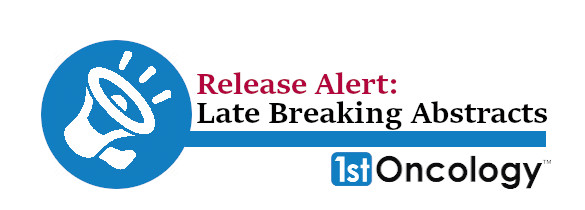
More than 60 Late Breaking Abstracts (LBA’s) are scheduled to be published at this year’s European Society of Medical Oncology (ESMO) (Free ESMO Whitepaper) Congress (E.S.M.O 2018). Below you will find the 27 published at the sessions on Sunday 21st October, the third day of the conference and the busiest for Late Breaking Abstracts.
For full analysis identifying new technologies, drugs, targets, start-ups etc. we recommend Commercial Interest at E.S.M.O Annual Meeting 2018: Analytical Tool.
- LBA4 – Effects of Abiraterone Acetate plus Prednisone/Prednisolone in High and Low Risk Metastatic Hormone Sensitive Prostate Cancer
- LBA5_PR – Radiotherapy (RT) to the primary tumour for men with newly-diagnosed metastatic prostate cancer (PCa): Survival results from STAMPEDE (NCT00268476)
- LBA6_PR – JAVELIN Renal 101: a randomized, phase 3 study of avelumab + axitinib vs sunitinib as first-line treatment of advanced renal cell carcinoma (aRCC)
- LBA7_PR – Maintenance olaparib following platinum-based chemotherapy in newly diagnosed patients (pts) with advanced ovarian cancer (OC) and a BRCA1/2 mutation (BRCAm): Phase III SOLO1 trial
- LBA13 – Prognostic impact of anthracyclines and immune/proliferation markers in TNBC according to pCR after de-escalated neoadjuvant chemotherapy with 12 weeks of nab-paclitaxel/carboplatin or gemcitabine: Survival results of WSG-ADAPT-TN phase II trial
- LBA14_PR – The HOBOE-2 multicenter randomized phase 3 trial in premenopausal patients with hormone-receptor positive early breast cancer comparing Triptorelin plus either Tamoxifen or Letrozole or Letrozole + Zoledronic acid.
- LBA15 – Preliminary results of the first-in-human (FIH) study of MK-1454, an agonist of stimulator of interferon genes (STING), as monotherapy or in combination with pembrolizumab (pembro) in patients with advanced solid tumors or lymphomas
- LBA16 – Phase 1/2, Multicenter, Open-Label Study of Intratumoral/Intralesional Administration of the Retinoic Acid–Inducible Gene I (RIG-I) Activator MK-4621 in Patients With Advanced or Recurrent Tumors
- LBA17 – Efficacy and Safety of Entrectinib in Patients with NTRK Fusion-Positive (NTRK-fp) Tumors: Pooled Analysis of STARTRK-2, STARTRK-1 and ALKA-372-001
- LBA24 – A Multi-Omic Analysis for Prospective Patient Stratification in Localised Colorectal Cancer (CRC).
- LBA25 – TAGS: a phase 3, randomised, double-blind study of trifluridine/tipiracil (TAS-102) versus placebo in patients with refractory metastatic gastric cancer
- LBA26 – Updated safety and clinical activity results from a Phase Ib study of atezolizumab + bevacizumab in hepatocellular carcinoma (HCC)
- LBA27 – A Randomized Multicentered Phase 2 Study to Evaluate SHR-1210 (PD-1 Antibody) in Subjects with Advanced Hepatocellular Carcinoma (HCC) who Failed or Intolerable to Prior Systemic Treatment
- LBA33 – A Phase Ib/2 study of neoadjuvant pembrolizumab (pembro) and chemotherapy for locally advanced Urothelial Cancer (UC)
- LBA34 – PD-L1 status and clinical outcomes to cabozantinib, sunitinib and everolimus in patients with metastatic clear-cell RCC treated on CABOSUN and METEOR clinical trials.
- LBA38 – Safety and Anti-Tumor Effects of MAGE-A10c796 TCR T-cells in Two Clinical Trials
- LBA39 – Intratumoral BO-112, a double-stranded RNA (dsRNA), alone and in combination with systemic anti-PD-1 in solid tumors
- LBA40 – Phase 1b KEYNOTE-200. A study of an intravenously delivered oncolytic virus, Coxsackievirus A21 in combination with pembrolizumab in advanced NSCLC and bladder cancer patients
- LBA45 – Phase 1b/2, open label, multicenter, study of the combination of SD-101 and pembrolizumab in patients with advanced melanoma who are naïve to anti-PD-1 therapy
- LBA46 – Phase 2 Study Comparing Pembrolizumab (PEM) with Intermittent/short‐term dual MAPK pathway inhibition plus PEM in patients harboring the BRAFV600 mutation (IMPemBra).
- LBA47 – Initial results from a phase 3b/4 study evaluating two dosing regimens of nivolumab (NIVO) in combination with ipilimumab (IPI) in patients with advanced melanoma (CheckMate 511)
- LBA48_PR – CTONG 1103:Erlotinib versus Gemcitabine plus Cisplatin as Neo-adjuvant Treatment for Stage IIIA –N2 EGFR-mutation Non-small-cell lung cancer (EMERGING): a Randomised Study
- LBA49 – Neoadjuvant nivolumab (N) or nivolumab plus ipilimumab (NI) for resectable non-small cell lung cancer (NSCLC)
- LBA62 – Health-related quality of life (HRQoL) for pembrolizumab or placebo plus carboplatin and paclitaxel or nab-paclitaxel in patients with metastatic squamous NSCLC: data from KEYNOTE-407
- LBA63 – Long-term survival in patients (pts) with advanced NSCLC in the KEYNOTE-010 study overall and in pts who completed 2 years of pembrolizumab (pembro)
- LBA64 – nab-Paclitaxel + Carboplatin Induction Followed by nab-Paclitaxel Maintenance in Squamous Non-Small Cell Lung Cancer (NSCLC): Results From the ABOUND.sqm Study
- LBA65 – IMpower131: Progression-free survival (PFS) and overall survival (OS) analysis of a randomised Phase III study of atezolizumab + carboplatin + paclitaxel or nab-paclitaxel vs carboplatin + nab-paclitaxel in 1L advanced squamous NSCLC
Schedule your 30 min Free 1stOncology Demo!
Discover why more than 1,500 members use 1stOncology™ to excel in:
Early/Late Stage Pipeline Development - Target Scouting - Clinical Biomarkers - Indication Selection & Expansion - BD&L Contacts - Conference Reports - Combinatorial Drug Settings - Companion Diagnostics - Drug Repositioning - First-in-class Analysis - Competitive Analysis - Deals & Licensing
Schedule Your 30 min Free Demo!